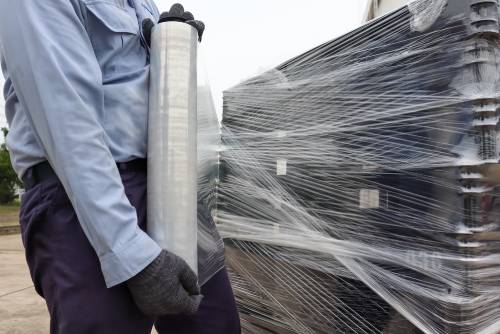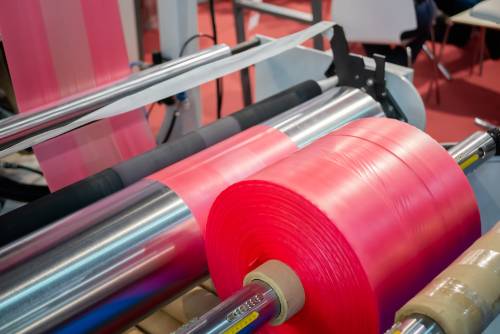
Polythene is a material that is widely used and whilst it gets criticism, if used in the right way it offers a whole host of benefits. We take a look at how it’s made, ways in which it is used and just some of the list of benefits of this material.
How is Polythene made?
Polythene is made by polymerizing ethylene. This is a hydrocarbon that is derived from natural gas or petroleum. The process of polymerization involves combining many small molecules of ethylene (monomers) to form long chains of polymer molecules. This process is typically done using a catalytic reactor, in which the ethylene is heated and pressurized in the presence of a catalyst, which initiates and speeds up the polymerization reaction.
There are several different methods for making polythene, including low-density polyethylene (LDPE), high-density polyethylene (HDPE), and linear low-density polyethylene (LLDPE). The main difference between these methods is the type of catalyst and the conditions used during the polymerization process.

LDPE is made using a low-pressure process and a free-radical catalyst, which results in a polymer with a lower density and a higher degree of branching. HDPE is made using a high-pressure process and a Ziegler-Natta catalyst, which results in a polymer with a higher density and a lower degree of branching. LLDPE is made using a low-pressure process, but with a different type of catalyst, typically a metallocene catalyst, which results in a polymer with a higher molecular weight and a lower degree of branching.
Once the polymer is formed, it can be extruded into a variety of forms such as film, sheets, or bags depending on the desired application and further processed like printing, laminating or cutting.
How is polythene used?
Polythene is used in a wide variety of applications due to its low cost, versatility, and durability. Some common uses of polythene include:
- Packaging: Polythene is widely used in packaging applications, such as bags, wraps, and containers, due to its moisture resistance and ability to protect products from air and moisture.
- Construction: Polythene is used in construction for waterproofing, as a vapor barrier and for insulation.
- Agriculture: Polythene is used in agriculture for making greenhouse covers, silage bags, and irrigation tubing.
- Industrial: Polythene is used in a variety of industrial applications, such as chemical storage, transport and processing due to its chemical resistance properties
- Consumer goods: Polythene is widely used in manufacturing of consumer goods such as toys, household items, and personal care products due to its low cost and ability to be easily molded into different shapes and sizes.
- Medical: Polythene is used in medical applications, such as tubing and bags for storing and transporting medical fluids and gases.
- Transport: Polythene is used in transport industry, such as in the manufacturing of fuel tanks and other components of vehicles.
- Textiles: Polythene fibers are used in a variety of textile applications, such as in clothing, upholstery, and carpets.
- Advertisment: Polythene is used in advertising, such as banners, posters and signs, due to its ability to be easily printed on.
- Recycling: Polythene can be recycled and used in a wide range of applications, such as in the production of plastic lumber, garden furniture, and other outdoor products.
Benefits of Polythene
- Low cost: One of the main advantages of polythene is its low cost. The raw materials used to produce polythene, such as natural gas and oil, are relatively inexpensive, and the production process is relatively simple, which helps to keep costs down. This makes polythene an attractive option for a wide range of applications, from packaging to construction.
- Versatility: Polythene is a highly versatile material that can be used in a variety of forms, such as bags, film, and sheets, and can be molded into various shapes and sizes. This makes it suitable for a wide range of applications, from packaging to construction.
- Lightweight: Polythene is a lightweight material that is easy to handle and transport. This makes it an attractive option for packaging and shipping applications, as it can help to reduce shipping costs. Additionally, its lightweight nature makes it easier to handle and install in construction projects.
- Moisture resistance: Polythene is resistant to moisture, which makes it suitable for packaging and protecting items that are sensitive to moisture. This can include food products, electronics, and other items that can be damaged by moisture.
- Durability: Polythene is a strong and durable material that can withstand a range of environmental conditions. This makes it suitable for use in a variety of applications, from packaging to construction, where the material needs to be able to withstand exposure to the elements.
- Impermeable: Polythene is an impermeable material that can protect items from air and moisture. This makes it suitable for packaging and protecting items that are sensitive to air and moisture, such as food products, electronics, and other items.
- Recyclable: Polythene can be recycled, reducing the amount of waste that enters landfills. This makes it an environmentally-friendly option for a wide range of applications.
- Chemical resistance: Polythene is resistant to many chemicals and can be used in a variety of industrial and laboratory applications. This makes it suitable for use in a variety of applications, such as chemical storage, transport and processing.
- Easy to print on: Polythene surface is easy to print on, making it suitable for various advertising, packaging and labeling. This allows for easy identification and branding of products.
- Low environmental impact: Polythene is made from natural gas and oil, which are abundant resources and its production process does not produce significant emissions. Additionally, it can be recycled, reducing the amount of waste that enters landfills, making it an environmentally-friendly option for a wide range of applications.
Find out more about all things polythene!